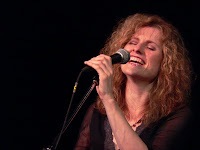Cathie Ryan: teaching tradition
What she teaches is traditional Irish singing and performance, and also Irish folklore and mythology. She has given week long workshops at the Swannanoa Gathering, worked
 with the Lincoln Center Institute, taught at Ceol Chairlinn, and given workshops at music festivals as well as taught in schools and community centers. “One of the lovely things about Irish traditional music is that you don’t have to have an advanced degree from Julliard to teach it -- you get to teach workshops!” says Ryan. who herself holds a degree in English literature. With fifteen years of a highly respected solo career in music as a performer and songwriter and before that eight years as a lead singer of the well known band Cherish the Ladies, she has certainly put herself through graduate level learning on musicianship, and her own research into songs and songwriting, as well as time living in both Ireland and America, have deepened her interest and knowledge in music and folklore as well.
with the Lincoln Center Institute, taught at Ceol Chairlinn, and given workshops at music festivals as well as taught in schools and community centers. “One of the lovely things about Irish traditional music is that you don’t have to have an advanced degree from Julliard to teach it -- you get to teach workshops!” says Ryan. who herself holds a degree in English literature. With fifteen years of a highly respected solo career in music as a performer and songwriter and before that eight years as a lead singer of the well known band Cherish the Ladies, she has certainly put herself through graduate level learning on musicianship, and her own research into songs and songwriting, as well as time living in both Ireland and America, have deepened her interest and knowledge in music and folklore as well.Music and stories called to Ryan from her early years. Growing up in Michigan as the first generation child of Irish immigrants, Ryan took in stories and songs from Irish tradition, Irish popular music, Motown, and American country music as well. ”The Gaelic League was always our social world,” she recalls, and she learned about the music of Appalachia from the family of a childhood friend.
All these things found their way into her own thirst to know about music. She learned music from sharing songs and tunes with other musicians, and chose to study English literature at university. “I’ve always been a very analytical person, and that’s probably why I majored in English literature, so I could explicate stories and analyze characters. Why did the writer choose to do this, and why did they choose to do that? Also I really love Jungian psychology, and Joseph Campbell’s ideas on mythology as well, the whole idea of archetypes, “ Ryan says. “I really believe we are connected to the ancestors, and it’s up to us to look for what these connections are.”
Those are ideas which move through Ryan’s performing and her teaching.

“When I teach mythology, that starts by the telling of a story -- the telling one of the tales, for instance, from the Tain, and then explicating that text with the class, going back to the beginning of the story and looking at the characters and archetypes. What is this character going through right now? why? what’s relevant about that to us right now? and then relate that back to the landscape of Ireland, which just resonates with the mythology and so it encompasses the sweep of centuries. You’ve got land that is still living that was inhabited by these kings and queens and goddesses and gods, and then you’re talking about what do they mean to me today. But then again, someone from the class could come up with some wonderful reading of the story and we might go in that direction -- if it’s compelling, and if it’s intelligent, and if it lights up the class, I’m going there, let’s follow that road,” she says. For her students Ryan wants to open doors in how they think and what they know about mythology. Thinking about the story of what’s going on and the people who are involved in it is her way of bringing them into this. When she’s teaching singing, the idea of connecting with story and character also applies.
She teaches technical aspects of singing traditional music as part of her workshops, but she goes beyond that. “It’s great to work with a class on honoring the song,“ she says. “ In order to do that, you really have to think about what do I want to bring to this song? If it’s an historical song, what was going on in this period of history? What did this person, the narrator, think about? What were they going through in their lives that brought them to express these feelings and emotions?” Opening doors for her students to think about making music, and listening to music, in this way is is what makes teaching a part of her work Ryan feels called to do -- that, and honoring the songs and the stories and the connections they create.
On her albums and in her concerts, Ryan most often chooses a mix of song, including songs in Irish and in English from the tradition, folk song from North America, songs from contemporary Irish and Scottish musicians such as Karine Polwart, Luka Bloom, and John Spillane, and songs she writes herself. On her album The Farthest Wave she recorded a song by Spillane called The Wild Flowers.
“I love that line from The Wild Flowers,” Ryan says “ which says ‘they were there before you, they’ll be here after you’.” For her students, she wants them to come away with the idea that “these songs and stories lived before you, and someone will tell them and sing them after you. This is your time time with this song and this story, and it’s an honor to be a part of that tradition.”

Cathie Ryan performs her music and teaches internationally. At the time of this conversation she was preparing for a workshop in Michigan to work with teachers about using music across the curriculum in different subjects, and she has performances at arts centers, universities, and with symphony orchestras scheduled in the coming months. You may find out more about what’s coming up for her here: Cathie Ryan’s tour schedule.
you may also wish to see
Cathie Ryan: Through Wind and Rain
Music Road: Cathie Ryan: Songwriter
at Perceptive Travel Cathie Ryan: An Evening in Belfast
Music Road: listening to Christmas: Shannon Heaton, Cathie Ryan, Mary Black, Hanneke Cassel
Music Road: ceol chairlinn: sharing music in winter
-->Your support for Music Road is welcome and needed. If you are able to chip in, here is a way to do that, through PayPal. Note that you do not have to have a PayPal account to do this. Thank you.
Another way to support: you could ![]()
If you enjoy what you are reading here, check out my newsletter at Substack for more stories about music, the people who make it and the places which inspire it.
Labels: blogsherpa, cathie ryan, ireland, irish music, michigan, singer, songwriter, teaching folklore, teaching music, usa







10 Comments:
Oh these classes sound like so much fun!
It's wonderful that there are folks out there passing along these traditions. Here in my area the Lark in the Morning music camp celebrates the Celtic and other folk traditions in a camp-like setting every summer. I've always wanted to go!
Kudos to Cathie! It's great that she is passing on her knowledge this way.
This really resonates with me, as I've seen first hand how a culture's music can be passed on. My son plays ‘ukulele and has learned so many Hawaiian songs at a culture/music camp that he's participated in for years. He helps to perpetuate that music by teaching. Now, he's headed off to the Institute of Hawaiian Music at UH Maui to learn even more. It's so important, what Cathie is doing.
After spending the weekend with family and talking about family, culture and tradition, this post was perfectly timed. It's great that Cathie is doing this and I bet many many appreciate it.
Cathie is certainly well-versed and an expert in the field, but I love that she emphasizes that you don't need a master's degree to love and appreciate music. It's within all of us.
Cathie is undoubtedly a wonderful teacher. I can easily see how teaching brings out her passion and dedication - lucky students!
I bet her classes are wonderful. I learned when I began teaching that a great teacher is one passionate about their subject matter.
Always appreciated The ladies keeping the music alive. the chance to take a workshop with an accomplished musician shouldn't be missed. I liked that the joy and connection to the song is emphasized. I'd rather hear a bad voice sing with enthusiasm than a good voice that just goes through the motions. Then there are the jigs, reels, airs, etc., all integral parts of the Irish music mosaic.
I like the idea that she teaches technical singing techniques but feels it's important to "honor the song" too.
Post a Comment
Subscribe to Post Comments [Atom]
<< Home